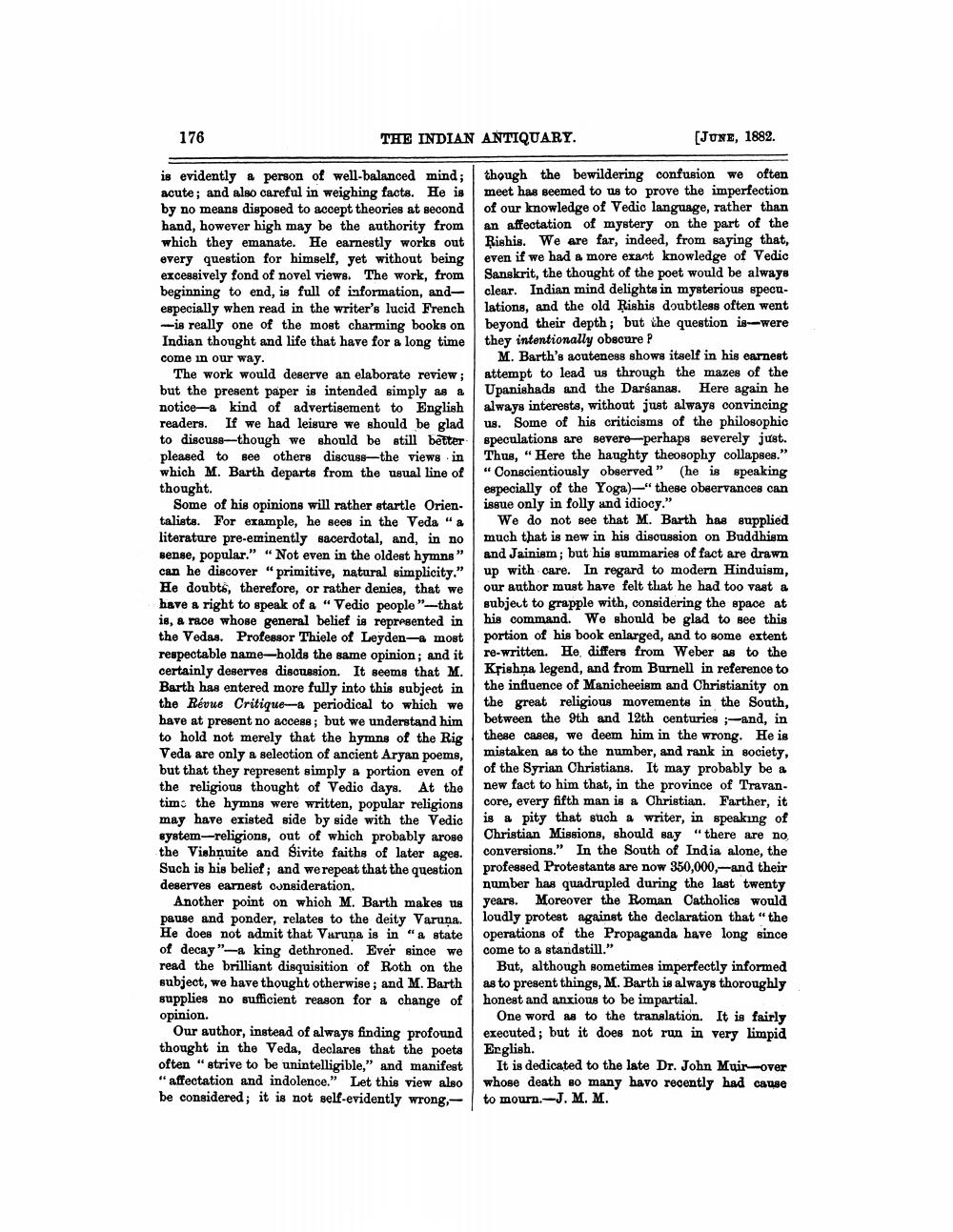________________
176
THE INDIAN ANTIQUARY.
(JUNE, 1882.
is evidently a person of well-balanced mind; though the bewildering confusion we often acute; and also careful in weighing facts. He is meet has seemed to us to prove the imperfection by no means disposed to accept theories at second of our knowledge of Vedic language, rather than hand, however high may be the authority from an affectation of mystery on the part of the which they emanate. He earnestly works out Rishis. We are far, indeed, from saying that, every question for himself, yet without being even if we had a more exact knowledge of Vedic excessively fond of novel views. The work, from Sanskrit, the thought of the poet would be always beginning to end, is full of information, and clear. Indian mind delights in mysterious specuespecially when read in the writer's lucid French lations, and the old Rishis doubtless often went -is really one of the most charming books on
beyond their depth; but the question is-were Indian thought and life that have for a long time they intentionally obscure P come in our way.
M. Barth's acuteness shows itself in his earnest The work would deserve an elaborate review; attempt to lead us through the mazes of the but the present paper is intended simply as a Upanishads and the Darsanas. Here again he notice- kind of advertisement to English always interests, without just always convincing readers. If we had leisure we should be glad us. Some of his criticisms of the philosophic to discuss-though we should be still better speculations are severe -perhaps severely just. pleased to see others discuss-the views in Thus, "Here the haughty theosophy collapses." which M. Barth departs from the usual line of "Conscientiously observed" (he is speaking thought.
especially of the Yoga)—"these observances can Some of his opinions will rather startle Orien- issue only in folly and idiocy." talists. For example, he sees in the Veda "a We do not see that M. Barth has supplied literature pre-eminently sacerdotal, and, in no much that is new in his discussion on Buddhism sense, popular." "Not even in the oldest hymns" and Jainism; but his summaries of fact are drawn can he discover "primitive, natural simplicity." up with care. In regard to modern Hinduism, He doubts, therefore, or rather denies, that we our author must have felt that he had too vast a have a right to speak of a " Vedio people”--that subject to grapple with, considering the space at is, a race whose general belief is represented in his command. We should be glad to see this the Vedas. Professor Thiele of Leyden- most
portion of his book enlarged, and to some extent respectable name-holds the same opinion; and it re-written. He differs from Weber as to the certainly deserves discussion. It seems that M.
Krishna legend, and from Burnell in reference to Barth has entered more fully into this subject in the influence of Manicheeism and Christianity on the Revue Critiquo-a periodical to which we the great religious movements in the South, have at present no accede; but we understand him between the 9th and 12th centuries ;-and, in to hold not merely that the hymns of the Rig these cases, we deem him in the wrong. He is Veda are only a selection of ancient Aryan poems,
mistaken as to the number, and rank in society, but that they represent simply a portion even of of the Syrian Christians. It may probably be a the religious thought of Vedio days. At the new fact to him that, in the province of Travan. tims the hymns were written, popular religions core, every fifth man is a Christian. Farther, it may have existed side by side with the Vedic
is a pity that such a writer, in speaking of system-religions, out of which probably arose Christian Missions, should say "there are no the Vishnuite and Sivite faiths of later ages.
conversions." In the South of India alone, the Such is his belief; and we repeat that the question
professed Protestants are now 350,000,--and their deserves earnest ownsideration.
number has quadrupled during the last twenty Another point on which M. Barth makes us years. Moreover the Roman Catholics would pause and ponder, relates to the deity Varuna. loudly protest against the declaration that "the He does not admit that Varuņa is in a state operations of the Propaganda have long since of decay"--king dethroned. Ever since we come to a standstill." read the brilliant disquisition of Roth on the | But, although sometimes imperfectly informed subject, we have thought otherwise ; and M. Barthas to present things, M. Barth is always thoroughly supplies no sufficient reason for a change of honest and anxious to be impartial.
One word as to the translation. It is fairly Our author, instead of always finding profound executed; but it does not run in very limpid thought in the Veda, declares that the poeta Erglish. often "strive to be unintelligible," and manifest It is dedicated to the late Dr. John Muir over "affectation and indolence." Let this view also whose death so many havo recently had cause be considered; it is not self-evidently wrong,- to mourn.-J.M.M.
opinion.




